Two candidates stood in the Iranian “elections”, but the regime had decided who was going to win long before any votes were cast. In spite of the mild, “loyal opposition” of Mousavi, large sections of the Iranian electorate used their vote to express opposition to the regime. Once the “result” was announced violence broke out on the streets, revealing the seething anger and discontent among the masses. This marks a new phase in the development of the Iranian revolution.
The French historian Alexis de Tocqueville once wrote that the most dangerous moment for a bad government is when it tries to reform. But it is even more dangerous when a bad regime refuses to reform.
History knows many examples of a rotten autocracy, which after a long period in power has succumbed to an irreversible process of inner decay. In such a moment, all the internal contradictions that have remained hidden beneath the surface suddenly emerge. There are always two main tendencies: the hard liners and the reformists. The latter say: “we must reform from the top or else we will be overthrown.” The former say: “We must oppose reform because once we start change we will be overthrown.” And both are correct.
What was true in France in 1789 is also true in Iran in 2009. After three decades in power the regime of the mullahs is deeply unpopular. Analysts therefore expected Mousavi, widely regarded as a “reformist”, to do well. A presidential debate between Mousavi and Ahmadinejad roused the nation, and in the last days Mousavi’s campaign caught fire, triggering massive street rallies in Tehran. What these rallies showed was a burning desire for change.
Mousavi had been widely expected to beat the controversial incumbent if there was a high turnout ‑ or at least do well enough to trigger a second round. What officials have called an unprecedented voter turnout at the polls Friday had been expected to boost Mousavi’s chances of winning the presidency. The voter turnout surpassed 80 percent, at least two officials said on Saturday.
Iran’s economic turmoil over the past four years should have undermined Ahmadinejad’s support even in rural areas to some extent. Yet the government announced that Ahmadinejad had not only won the election, but had secured a landslide with 62.63 percent of the vote as compared to Mir Hossein Mousavi’s 33.75 percent. According to the results, which were announced with indecent haste, Mousavi even lost in the area of Teheran where he has his main base. This virtuoso display of vote rigging was so blatant that it shocked even a people for whom such things could be regarded as normal practice.
Rigged elections
The speed with which the announcement was made was in itself sufficient to indicate a massive fraud. Iran remains a predominantly rural country with an infrastructure that does not permit such a rapid assessment of election results. In a genuine election it would take several days to get all the results in from the provinces and villages and remote areas. Instead, Ahmadinejad immediately announced that he had won by a big majority. “The people of Iran inspired hope for all nations and created a source of pride in the nation and disappointed all the ill wishers,” Ahmadinejad said in a nationwide TV address Saturday night. “This election was held at a juncture of history.”
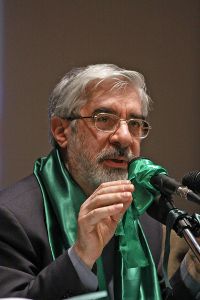 Mir-Hossein Mousavi. Photo by Mardetanha.For a despotic regime that holds all the reins of power firmly in its hands, it is not a difficult task to rig an election. After the polls closed – according to reports coming out of Iran ‑ heavily armed Iranian Revolutionary Guard Corps were out on the streets. In one area of north Tehran, a stronghold of opposition challenger and reformist ex-Prime Minister Mousavi, foreign journalists reported a convoy of at least fifteen military vehicles filled with armed guards making their way along the side of the road. The Interior Ministry was also blocked and heavily guarded as the regime feared that Mousavi supporters might gather there to protest against the election count.
Mir-Hossein Mousavi. Photo by Mardetanha.For a despotic regime that holds all the reins of power firmly in its hands, it is not a difficult task to rig an election. After the polls closed – according to reports coming out of Iran ‑ heavily armed Iranian Revolutionary Guard Corps were out on the streets. In one area of north Tehran, a stronghold of opposition challenger and reformist ex-Prime Minister Mousavi, foreign journalists reported a convoy of at least fifteen military vehicles filled with armed guards making their way along the side of the road. The Interior Ministry was also blocked and heavily guarded as the regime feared that Mousavi supporters might gather there to protest against the election count.
Ibrahim Yazdi, a leading Iranian dissident and Iran’s foreign minister in the early days of the Islamic Republic, told American journalist Robert Dreyfuss:
“Many of us believe that the election was rigged. Not only Mousavi. We don’t have any doubt. And as far as we are concerned, it is not legitimate. There were many, many irregularities. They did not permit the candidates to supervise the election or the counting of the ballots at the polling places. The minister of the interior announced that he would oversee the final count in his office, at the ministry, with only two aides present.
“In previous elections, they announced the results in each district, so people could follow up and make a judgment about the validity of the figures. In 2005, there were problems: in one district there were about 100,000 eligible voters, and they announced a total vote of 150,000. This time they didn’t even release information about each particular district.
“In all, there were about 45,000 polling places. There were 14,000 mobile ones, that can move from place to place. Many of us protested that. Originally, these mobile polling places were supposed to be used in hospitals and so on. This time, they were used in police stations, army bases, and various military compounds. When it comes to the military compounds and so on, if even 500 extra votes were put into each of the 14,000 boxes, that is seven million votes.
“Mousavi and Karroubi [the main opposition candidates] had earlier established a joint committee to protect the peoples’ votes. Many young people volunteered to work on that committee. But the authorities didn’t let it happen. Last night [that is, election night] the security forces closed down that committee. There is no way, independent of the government and the Guardian Council, to verify the results.”
With a rigged election result in his pocket Ahmadinejad’s insolence knew no bounds. The president said the elections were the “model of democracy” and accused “western oppressors” of criticizing the election process. “On Friday’s election, the people of Iran emerged victorious,” he declared. “The elections in Iran are really important. Election means consensus of all people’s resolve and their crystallization of their demands and their wants, and it’s a leap toward high peaks of aspiration and progress. Elections in Iran are [a] totally popular-based move that belongs to the people with a look at the future, aimed at constructing the future.”
He indicated progress through consensus, saying economic and infrastructure reforms can be accomplished in Iran through a collective process. “All of us can join forces,” he said, as his armed thugs were smashing people’s faces on the streets. Tens of thousands of flag-waving Ahmadinejad supporters gathered in the capital’s Valiasr Square for the president’s victory speech this evening, as he attempted a show of force he hopes will quell opposition protests.
“The 12 June election was an artistic expression of the nation, which created a new advancement in the history of elections in the country,” the ayatollah Khamenei said. “The over 80 percent participation of the people and the 24 million votes cast for the president-elect is a real celebration which with the power of almighty God can guarantee the development, progress, national security, and the joy and excitement of the nation.”
Spontaneous protests
The nation was certainly excited – but not for joy. Reformist candidate Mehdi Karrubi called the declared results of the elections a “joke” and “astonishing.” Even while Ahmadinejad praised the result and the huge turnout, Mousavi and supporters in the Tehran streets were crying foul as street clashes broke out. On Saturday afternoon the streets of the capital are generally quiet. But last Saturday spontaneous street demonstrations erupted on the streets of Tehran. This reflected an enormous accumulation of anger, despair, and bitterness within Iranian society that is pregnant with revolutionary implications.
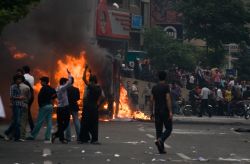 Protesters in Tehran. Photo by Shahram Sharif.Khamenei indicated that Iranians should take a deep breath in the aftermath of the vote. “The Saturday after the election should always be a day of affection and patience,” he said. “Both the supporters of the elected candidate and the supporters of other respectable candidates should refrain from making any provocative and doubtful behaviour. The respectable president-elect is the president of all the people of Iran and everybody, including yesterday’s rivals, should protect and help him.” These words from the Supreme Leader showed the regime’s fear of public disturbances. They were not wrong to have such fear.
Protesters in Tehran. Photo by Shahram Sharif.Khamenei indicated that Iranians should take a deep breath in the aftermath of the vote. “The Saturday after the election should always be a day of affection and patience,” he said. “Both the supporters of the elected candidate and the supporters of other respectable candidates should refrain from making any provocative and doubtful behaviour. The respectable president-elect is the president of all the people of Iran and everybody, including yesterday’s rivals, should protect and help him.” These words from the Supreme Leader showed the regime’s fear of public disturbances. They were not wrong to have such fear.
Demonstrators chanted, “the president is committing a crime and the supreme leader is supporting him”, highly inflammatory language in a regime where the supreme leader, Ali Khamenei, is considered irreproachable. Shops, government offices and businesses closed early as tension mounted. Crowds also gathered outside Mousavi’s headquarters but there was no sign of Ahmadinejad’s chief political rival. Supporters waved their fists and chanted anti-Ahmadinejad slogans.
Protesters set fire to rubbish bins and tyres, creating pillars of black smoke among the apartment blocks and office buildings in central Tehran. An empty bus was engulfed in flames on a side road. Police fought back with clubs, including mobile squads on motorcycles swinging truncheons, as protesters hurled stones and bottles at officers, shouting “Mousavi, give us our votes back” and “the election was full of lies”.
More than 100 reformists, including Mohammad Reza Khatami, the brother of former president Mohammad Khatami, were arrested, according to leading reformist Mohammad Ali Abtahi. He told Reuters they were members of Iran’s leading reformist party, Mosharekat. A judiciary spokesman denied they had been arrested but said they were summoned and “warned not to increase tension” before being released. The state imprisons and tortures trade unionists and beats up students, but bourgeois politicians get off with just a slap on the wrist.
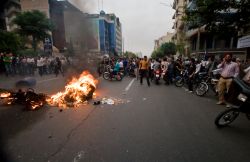 Protesters in Tehran. Photo by Shahram Sharif.People leaned out of windows and balconies to watch the throngs of protesters march, many of whom were Mousavi supporters and conducted largely noisy but peaceful demonstrations. Later in the evening, an agitated and angry crowd emerged in Tehran’s Moseni Square, with people breaking into shops, starting fires and tearing down signs. Two groups of people faced off against each other in the square, throwing rocks and bottles and shouting angrily. Observers believe the two sides could be supporters of Ahmadinejad on the one hand, and Mousavi on the other.
Protesters in Tehran. Photo by Shahram Sharif.People leaned out of windows and balconies to watch the throngs of protesters march, many of whom were Mousavi supporters and conducted largely noisy but peaceful demonstrations. Later in the evening, an agitated and angry crowd emerged in Tehran’s Moseni Square, with people breaking into shops, starting fires and tearing down signs. Two groups of people faced off against each other in the square, throwing rocks and bottles and shouting angrily. Observers believe the two sides could be supporters of Ahmadinejad on the one hand, and Mousavi on the other.
The protests, which were clearly spontaneous, were not limited to Teheran. They also broke out in other cities, including Tabriz, Orumieh, Hamedan and Rasht. It is clear that nobody organized these protests, and least of all the reformist leaders. The new technology has been a key tactic in politically mobilizing young people in Iran, but text messaging has not been working in Iran over recent days and Facebook was closed down. However, the old fashioned method of word of mouth still functions and Iranian protesters still arrived en masse at meeting places around Tehran on Saturday.
On Sunday the rioting continued. “There was this cat-and-mouse game between the rioters and the police,” said Samson Desta, a CNN reporter, who was hit by a police baton. “For the time being, it seems like police have things under control. But we spoke to a lot of students and they’re saying, ‘This is not going to go away. They may stop us now but we will come back and make sure our voices will be heard’.”
This was the second day of protests in Tehran. On Saturday, thousands of demonstrators shouting “Death to the dictatorship” and “We want freedom” burned police motorcycles, tossed rocks through store windows, and set trash cans on fire.
On Sunday night a tense calm settled on the streets of Tehran, but the BBC’s Jon Leyne, in the city, reported that clashes broke out by the office of Irna, Iran’s official news agency, and also in at least one suburb. There were also new reports of a clampdown on independent media. The offices of the Saudi-funded Arabic TV station al-Arabiya were shut down for “unknown reasons”, the channel said. Mobile phone service was restored but there were reports that text messaging remained restricted and curbs continued on access to popular internet sites, including the BBC. These actions do not show confidence but an extreme nervousness on the part of the regime.
Hypocrisy of imperialists
Reaction emerged across the world, as countries such as the United States and Canada voiced concern over claims of voter irregularities. But the western governments who have been so outspoken in their criticism of the lack of human rights in Iran have been remarkably circumspect about the blatant electoral fraud and violence in Iran.
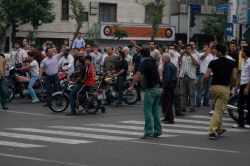 According to a CNN report, US military commanders in the Middle East were sent a message reminding American forces to maintain discipline and prudence if they encounter any Iranian military forces during potential unrest surrounding Iran’s presidential election. US military concerns are taking into account “heightened Iranian sensitivity and maybe even fear for potential internal and external security threats,” one official said.
According to a CNN report, US military commanders in the Middle East were sent a message reminding American forces to maintain discipline and prudence if they encounter any Iranian military forces during potential unrest surrounding Iran’s presidential election. US military concerns are taking into account “heightened Iranian sensitivity and maybe even fear for potential internal and external security threats,” one official said.
Criticism in Washington has been unusually muted. Hilary Clinton has kept her mouth shut, leaving it to “the invisible man”, US vice-president, Joe Biden, to express his “doubts” about “the way they’re suppressing crowds, the way in which people are being treated”, although, using guarded language, he said the US had to accept “for the time being” Tehran’s claim that Ahmadinejad won a resounding re-election. “There’s an awful lot of questions about how this election was run,” said Biden. “We don’t have enough facts to make a firm judgment.”
The French foreign minister, Bernard Kouchner, said that his government was worried about the situation and criticized “the somewhat brutal reaction” by authorities in response to demonstrations. The EU said in a statement it was “concerned about alleged irregularities” during Friday’s vote.
This polite reticence of the imperialists is no accident. They are terrified of a revolution in Iran that will act like an earthquake throughout the Middle East and Asia. Moreover, Washington is hoping to re-establish good relations with the Teheran government, whose assistance they need to ensure an orderly retreat from Iraq and provide a guaranteed route for supplies to Afghanistan. It also needs Iranian support for its latest “peace initiative” over the Palestinian question. At least it would like assurances that Teheran will not sabotage it – although Netanyahu is already making a good job of that by insisting that any Palestinian state must be disarmed and renounce the right of return for the Palestinian Diaspora.
It is these factors that determine Obama’s conciliatory policy to the Islamic Republic, which we predicted in advance [see The invasion of Gaza: what does it mean?]. A week into his presidency, Obama extended an olive branch to Tehran, asking the regime to “unclench its fist”. Two months later, Obama broadcast a message to Iran, for the first time recognizing the ayatollahs as the legitimate representatives of the Iranian people. Last month, Obama acknowledged the Islamic Republic’s right to enrich uranium and, in Cairo, he admitted CIA involvement in the overthrow of the Mossadegh government more than a half-century ago.
The people of Iran have long memories and know enough about imperialism to hate it with all their heart. When Prime Minister Mossadegh was ousted in the 1953 coup organized by the CIA and British intelligence the so-called western democracies replaced Iranian democracy with the monstrous dictatorship Shah. His bloody and corrupt rule was based on a reign of mass terror in which the notorious Savak secret police carried on a systematic campaign of murder and torture. The so-called western democracies supported this despotic puppet of imperialism and had nothing to say about the wholesale violation of human rights in Iran then. That is why Iranians have no reason to trust the good will of imperialism or listen to its hypocritical sermons on “democracy” today!
Splits in regime
After the election Teheran was buzzing with rumours of a coup d’etat. But in reality this is not necessary. Ahmadinejad has already gathered so much power in his hands that he has already established a dictatorship in fact, if not legally. In addition to the regular forces of the state, he controls the Revolutionary Guard, which he used to brutally crush the demonstrations last weekend. Ahmadinejad controls the ministry of the interior, the ministry of information, the ministry of intelligence.
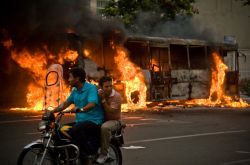 Burning bus in Tehran. Photo by Shahram Sharif.After the elections the security forces occupied the offices of many newspapers, to make sure that their reporting on the election was favourable. They changed headlines of many papers. This is an excellent way of ensuring good election coverage! The Guards are taking over everything, including many economic institutions. The ministry of the interior is tightening its control in all the provinces.
Burning bus in Tehran. Photo by Shahram Sharif.After the elections the security forces occupied the offices of many newspapers, to make sure that their reporting on the election was favourable. They changed headlines of many papers. This is an excellent way of ensuring good election coverage! The Guards are taking over everything, including many economic institutions. The ministry of the interior is tightening its control in all the provinces.
There are also rumours that Ahmadinejad is thinking about changing the Constitution to allow the president to serve more than two terms, to make his presidency more or less permanent. He is re-enacting the coup of Louis Bonaparte, who combined fraudulent elections and parliamentary intrigues with a reign of terror on the streets conducted by the notorious Society of 10 December, composed of thugs, criminals and lumpenproletarians. His social base is also similar: the backward peasantry, which can be used against the more advanced cities and towns.
In theory the situation looks hopeless. But this is only on the surface. Ahmadinejad and his followers have been kept in office, but the election has left Iran’s capital steeped in bitterness and anger. The new government will be faced with serious problems at all levels, particularly the economy. The last remaining illusions of the peasantry will be shattered by the hardships imposed by the economic crisis.
In the last period, Ahmadinejad was kept in power partly on the basis of repression and anti-American demagogy but mainly by using Iran’s oil wealth for populist measures. This ensured him a certain base of support in the population, especially among the peasantry. But now the economic crisis and the falling price of oil will reduce his room for manoeuvre on this front. On the other hand, the “anti-imperialist” demagogy is wearing thin. People cannot eat nuclear warheads!
The history of dictatorial and autocratic regimes shows that it is impossible to maintain such a regime on the basis of repression alone. Once the masses start to move, no state apparatus, no matter how powerful or ferocious, can stop them. That is the lesson of France in 1789, of tsarist Russia in 1917 and of the Shah of Iran in 1979. Louis Bonaparte took power in a coup and stayed in power for two decades. But in the end his rule ended in the Paris Commune. Ahmadinejad will not be in power for so long for the reasons we have explained, and the longer he clings to power, the more explosive the situation will become and the sharper will be the internal contradictions in the regime.
Despite the show of strength, the inner cracks that are splitting the regime are deepening. There are voices in the establishment that are challenging Ahmadinejad. And it is not clear that he and the Sepah (the Revolutionary Guard) will be strong enough to overcome them. The Supreme Leader, Ayatollah Ali Khamenei, is playing the Bonaparte, balancing between the factions. There will be clashes and splits between different factions that reflect a deep crisis of the regime itself.
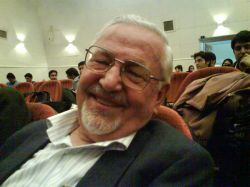 Ibrahim Yazdi. Photo by Hessam Armandehi.In the interview we have already mentioned, Ibrahim Yazdi refers to the splits in the regime:
Ibrahim Yazdi. Photo by Hessam Armandehi.In the interview we have already mentioned, Ibrahim Yazdi refers to the splits in the regime:
“After the last election [2005], after Ahmadinejad was first elected, there were many questions raised about Ahmadinejad’s effort to isolate the Leader. We talked openly about this. This time, in preparation for the vote, they isolated him even further. For instance, in years past [former President] Ali Akbar Hashemi-Rafsanjani was influential, perhaps even more influential than the leader. Now, with the slogans being used at Ahmadinejad’s rallies, things like ‘Death to Hashemi!’, they have created a deep rift. Khamenei has also lost the support of many high-ranking members of the clergy.”
Cowardice of reformers
The liberal reformers in Iran and abroad are sunk in the depths of despair. Mousavi has pledged to fight the verdict, using words like “tyranny” and adding, “I will not surrender to this dangerous charade.” Even before the vote count ended, Mousavi issued a sharply worded letter urging the counting to stop because of “blatant violations” and lashed out at what he indicated was an unfair process.
The opposition leader said the results from “untrustworthy monitors” reflects “the weakening of the pillars that constitute the sacred system” of Iran and “the rule of authoritarianism and tyranny.” Independent vote monitors were banned from polling places. “The results announced for the 10th presidential elections are astonishing. People who stood in long lines and knew well who they voted for were utterly surprised by the magicians working at the television and radio broadcasting,” Mousavi said in his statement.
Mousavi’s newspaper, Kalemeh Sabz, or the Green Word, did not appear on newsstands today. An editor speaking anonymously said authorities had been upset with Mousavi’s statements. The paper’s website reported that more than 10million votes in Friday’s election were missing national identification numbers, which made the votes “untraceable”.
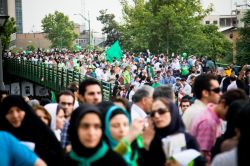 Protesters in Tehran. Photo by Shahram Sharif.As his supporters took to the streets of the capital again to face the batons and tear gas, Hossein Mousavi has launched a formal appeal against the election result. He has appealed to the ruling Council of Guardians to overturn the result, and urged his supporters to continue protests “in a peaceful and legal way”. “We have asked officials to let us hold a nationwide rally to let people display their rejection of the election process and its results,” said Mousavi. The Council of Guardians is a constitutionally mandated body of six clerics and six jurists, which functions as Iran’s electoral authority and has other powers. But Ayatollah Ali Khamenei is the Supreme Leader and he has already stated that the election had been conducted fairly and ordered the three defeated candidates and their supporters to avoid “provocative” behaviour.
Protesters in Tehran. Photo by Shahram Sharif.As his supporters took to the streets of the capital again to face the batons and tear gas, Hossein Mousavi has launched a formal appeal against the election result. He has appealed to the ruling Council of Guardians to overturn the result, and urged his supporters to continue protests “in a peaceful and legal way”. “We have asked officials to let us hold a nationwide rally to let people display their rejection of the election process and its results,” said Mousavi. The Council of Guardians is a constitutionally mandated body of six clerics and six jurists, which functions as Iran’s electoral authority and has other powers. But Ayatollah Ali Khamenei is the Supreme Leader and he has already stated that the election had been conducted fairly and ordered the three defeated candidates and their supporters to avoid “provocative” behaviour.
The mass demonstration planned by the opposition to protest electoral fraud has been banned. Therefore, the road to redress by legal and constitutional means is blocked. The only way to conquer democratic rights in Iran is by taking the revolutionary road. Iran, says Mousavi, “belongs to the people and not cheaters.” There is even talk of his calling a general strike. But words are cheap, and the Iranian bourgeois reformist leaders would be more afraid of a movement of the masses than Khamenei himself.
Role of the working class
Like the Russian Cadets, the liberal reformers in Iran are terrified of revolution. Ibrahim Yazdi told his American interviewer: “Certainly, we are concerned about spontaneous reactions. Iran’s youth has been engaged and mobilized. Around the country, there have already been some violent clashes. We do not agree with violence, because violence will only give the Right an excuse to suppress the opposition.” And again: “We are nor after subversion. We do not want to change the Constitution. We do want to create a viable political force that can exert its influence.” These words indicate the real psychology of the bourgeois reformers in Iran. They could have been copied from any newspaper of the Russian Liberals in February 1917.
The real historical analogy, however, is not Russia in 1917 but rather 1905, or even before that. Like the Russian Revolution before 1905, the Iranian Revolution is still in its infancy. It has a long way to run, and this is not a bad thing from the standpoint of the Iranian Marxists who need time to build their forces. Like the Russian workers before 1905, the Iranian working class is mainly young and inexperienced. The old generation of worker activists, who were mainly formed in the school of Stalinism, has largely disappeared, decimated by repression and disoriented by the false policies of their leaders.
It will require time and the experiences, both of victories and defeats, before the Iranian working class comes to the conclusion of the need to take power. Let us recall that in January 1905 the young Russian proletariat first came on the scene of history in a peaceful demonstration led by a priest, with religious icons in their hands, carrying a petition to the tsar. But one bloody clash was sufficient to impel them on the road to revolution in the space of 24 hours. We can expect similar sudden and sharp changes in Iran.
The campaign of Mousavi aroused the hopes of many people, especially the middle class youth and the women (he promised more rights for women). Now these hopes have been dashed. The police and “revolutionary guards” have given the youth an excellent lesson in the value of Iranian democracy with truncheons, fists and boots. The situation remains explosive. But in the absence of a clear programme, perspective and leadership, aimless street protests and rioting leads nowhere. Therefore probably the present wave of unrest will die down for a while. But it will come back with even greater violence at a later stage.
The reformers are weeping and wailing about the election defeat, but in reality these elections have solved nothing for the Iranian people, the working class or the regime itself. This decrepit regime is like the Old Man of the Sea who climbed onto the shoulders of Sinbad and refused to dismount. These elections are just one more lesson in the hard school of life, which will eventually convince the workers and youth that in order to shake the Old Man of the Sea from off their backs very radical measures will be necessary.
The real weakness of the movement for democracy is that the powerful Iranian proletariat has not yet moved in a decisive way as it did in 1979. After long years of repression during which the workers movement was effectively beheaded, the working class needs time to find its feet. Like an athlete who has been inactive for a long time, the Iranian workers need to stretch their muscles and engage in exercise before moving decisively into action. There have already been many strikes on economic issues. The pressure from below is building up. This pressure finds its reflection even in the Labour House, the organization set up by the regime to control the workers. In the recent period the official journal of the Labour House even published an article by Lenin. How times are changing!
Iran is an overwhelmingly young country. Its population has a median age of 27. These people cannot remember a time when the mullahs were not in power. Long ago the mullahs were considered to be incorruptible, in contrast to the degenerate pro-western monarchy. But that was long ago. After decades in power the mullahs have been exposed as corrupt and the regime is losing the authority it used to have. Ahmadinejad had to bus in supporters from the villages in order to stage his mass rally. His real base is the Revolutionary Guards, but even they no longer inspire the kind of terror they did in the past. The most significant thing about the riots this weekend was not that they were suppressed, but that so many people were prepared to come onto the streets to defy the state and its repressive forces. This means that the days of the regime are numbered.
In the end it will result in a crisis. This will be a government of crisis, which will probably not last its full term. The political and social divisions inside Iran will be widened. The militancy of the workers will grow and express itself first in economic strikes for better wages and conditions, as we have already seen in the past few years, and later as political strikes and demonstrations. The most urgent need now is to organize the workers and provide the movement with a coherent programme, policy and banner. This can only be the red banner of socialism.
It is quite natural that the students are playing a key role at this stage in the revolution. It is very similar to the situation in Russia in 1901-3, or in Spain in 1930-31, just before the fall of the monarchy. Trotsky wrote at that time:
“When the bourgeoisie consciously and stubbornly refuses to take upon itself the solution of the tasks flowing from the crisis in bourgeois society; when the proletariat appears to be still unprepared to undertake the solution of these tasks itself, then the proscenium is often occupied by the students … The revolutionary or semi-revolutionary activities of the students mean that bourgeois society is passing through a deep crisis…
“The Spanish workers displayed an entirely correct revolutionary instinct when they lent their support to the manifestations of the students. It is understood that they must do it under their own banner and under the leadership of their own proletarian organization. This must be guaranteed by Spanish Communism, and for that it needs a correct policy.
“This road pre-supposes on the part of the Communists a decisive, bold and energetic struggle for democratic slogans. Not to understand this would be the greatest mistake of sectarianism… If the revolutionary crisis is transformed into a revolution it will inevitably exceed the bourgeois boundaries, and in the event of victory, will have to transfer the power to the proletariat.” (Trotsky, Problems of the Spanish Revolution, May 1930)
The forces of the Iranian Marxists are small but they are growing by the day. By skilfully combining democratic demands with transitional demands linking the day to day struggles with the idea of socialist revolution, they will connect with an increasingly broad layer of workers and students who are looking for a fundamental change in society. The future of Iran lies on the revolutionary road, and the Iranian revolution is destined to shake the world.

